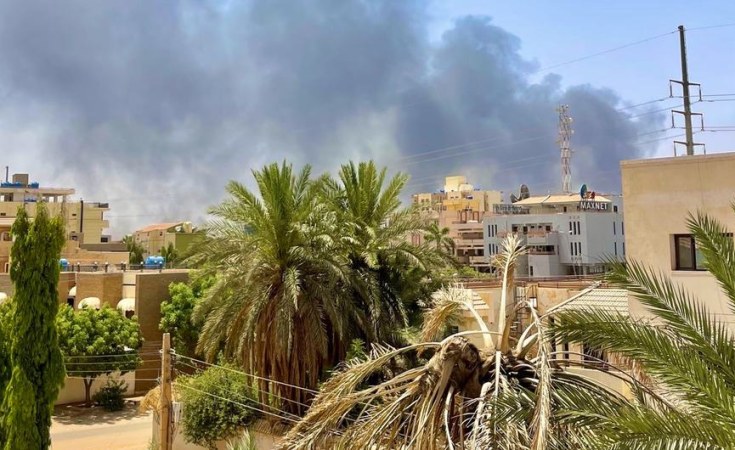Every phone call I make home to Sudan is interrupted by the crackle of gunshots or an explosion in the background. This is followed by an eerie pause from the person on the other end, before one of us carries on with the conversation. Several days after the outbreak of fighting in Sudan, some people may already be treating the situation as normal. But it isn't.
The fighting between the Sudanese armed forces (SAF) and the Rapid Support Forces (RSF) - Sudan's two main military organisations - that broke out in the capital, Khartoum, on 15 April is unprecedented even given Sudan's turbulent and violent history. While Khartoum has not escaped violence in its modern history, including an attack by a rebel group in 2008 and decades of brutal dispersals of protesters, the scale and intensity of the current fighting is previously unknown for the capital. The violence has rapidly spread across Khartoum and to other cities and regions more familiar with the horrors of war, including the restless Darfur region.
Doctors released figures on Wednesday showing the civilian death toll at about 180, with 1,000 injured. The casualty figure could be much higher given that many people are unable to access medical care. Healthcare professionals describe a tragic situation, where they are lacking medical supplies, blood transfusion equipment and other vital resources. They themselves face significant risks, as several hospitals have been caught in the crossfire.
Witnesses in various parts of the capital said they saw buildings hit by artillery shells, airstrikes and bullets piercing walls and windows. Activists on social media have been spreading awareness messaging on how to stay safe indoors. Entire neighbourhoods of Khartoum have been cut off from water and electricity because of damage to key infrastructure. Since Tuesday, there have been many reports of RSF soldiers looting homes across the capital.
The warring parties both have lengthy and notorious records of involvement in atrocities - from the conflict in Darfur that broke out two decades ago to the crackdown against peaceful protesters after their joint coup in 2021. Neither force has demonstrated any concern for civilian lives.
The leaders of these forces, Gen Abdel Fattah al-Burhan and Gen Mohamed Hamdan Dagalo ("Hemedti") have never been investigated for the crimes in which they are implicated. Instead, both have seen their powers increase in recent years.
Burhan and Hemedti jointly led the 25 October 2021 coup, which brought an end to the country's short-lived transition to civilian rule. But from the get-go this was always a marriage of convenience, with both leaders keen to tighten their grip on power and financial resources. For months they maintained a public image of unity, but cracks began to show and these tensions became evident in the weeks preceding the fighting after Burhan demanded the rapid integration of the RSF into the military.
What needs to happen now? Because the generals have demonstrated little regard for the laws of war, concerted international pressure from concerned governments needs to be swiftly applied to minimise harm to civilians.
It's critically important for the two armed forces not to target or indiscriminately attack civilians or civilian infrastructure, and instead to do everything they can to protect them. Neither side should be using explosive weapons with wide-area effects, such as artillery or airstrikes, in populated areas. Everyone taken into custody, whether civilians or captured combatants, needs to be treated humanely. The warring parties also need to facilitate, not hinder, the delivery of humanitarian aid, and allow civilians to flee fighting and reach medical facilities.
The United Nations, United Kingdom, United States and European Union need to overhaul their approach: the situation is at breaking point and there should be no going back to business as usual. The UK, in particular, which usually leads on Sudan at the UN security council, has a special responsibility to show strong leadership, including imposing targeted sanctions against all abusive leaders and expanding the existing arms embargo to cover all of Sudan. Russia, China and the United Arab Emirates should support security council action. The UK and other countries should adopt an immediate moratorium on deporting people to Sudan.
The security council has long been passive in the face of the former president Omar al-Bashir's obstruction of justice and the Sudanese authorities' recent lack of cooperation with the international criminal court's investigation into crimes in Darfur. The international community needs to apply maximum pressure for meaningful accountability. Persistent impunity for atrocities in Sudan has no doubt fuelled what we're seeing today.
As for myself, I never again want to have to put down the phone after talking with a relative, friend or contact who has no idea if they will survive the day. That should not be too much to ask.
Mohamed Osman, Researcher, Africa


